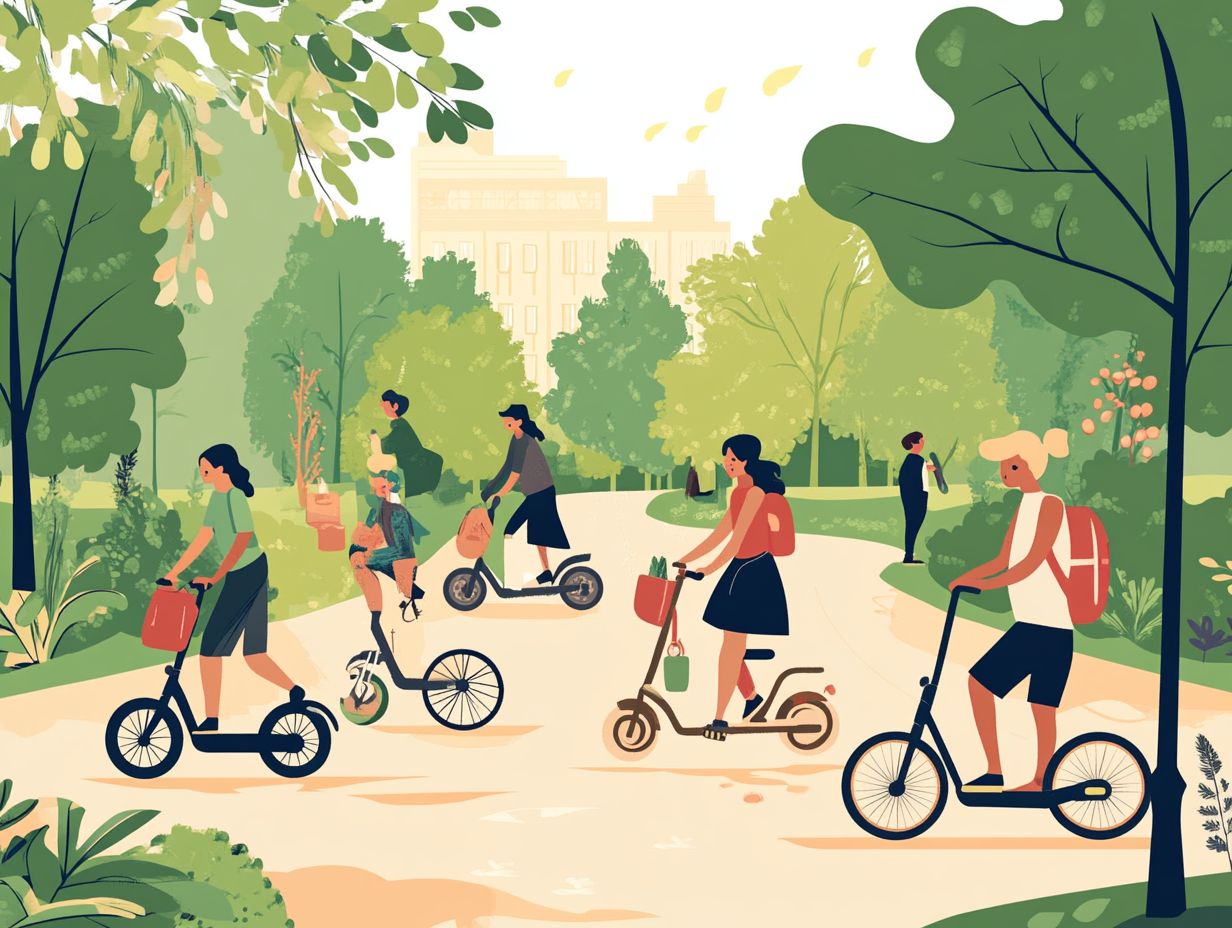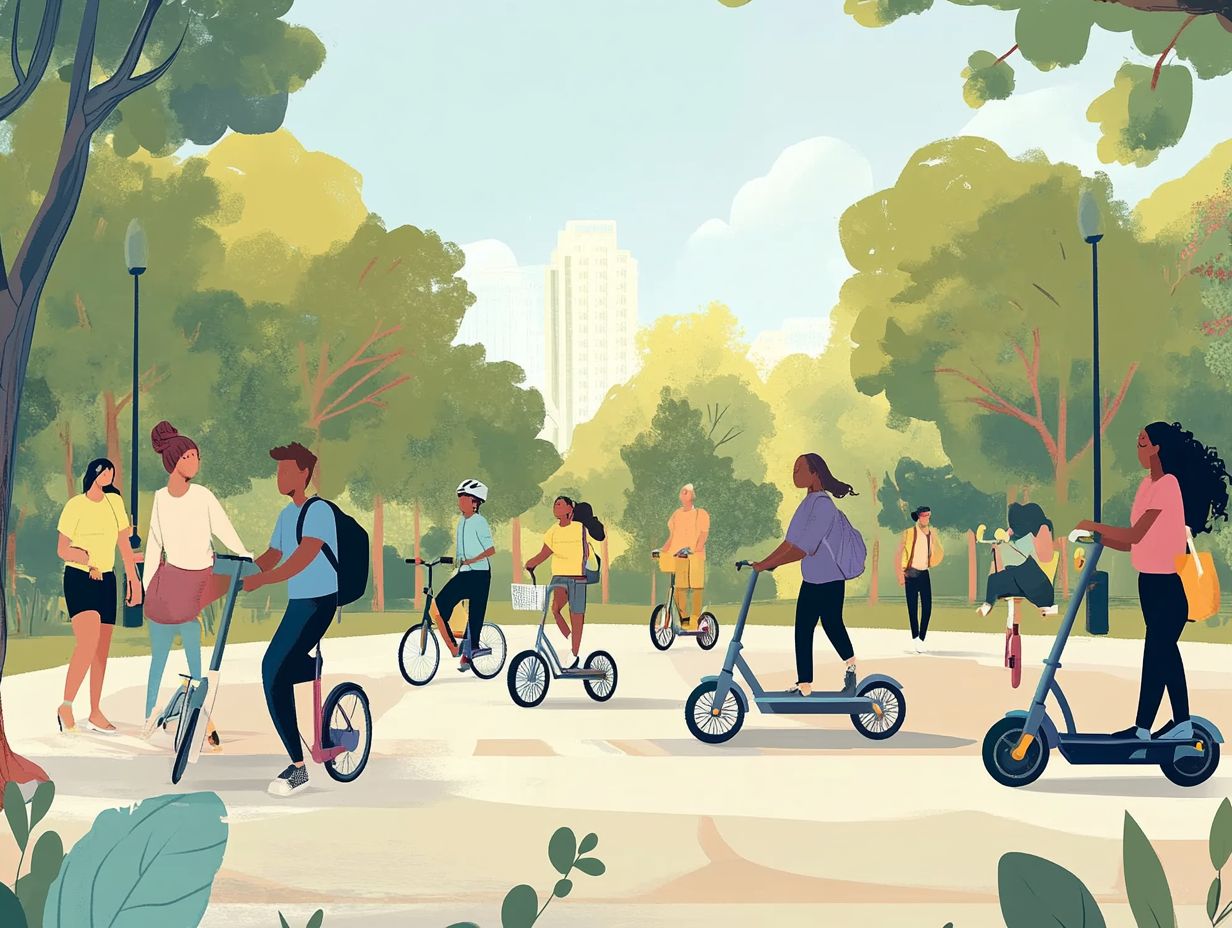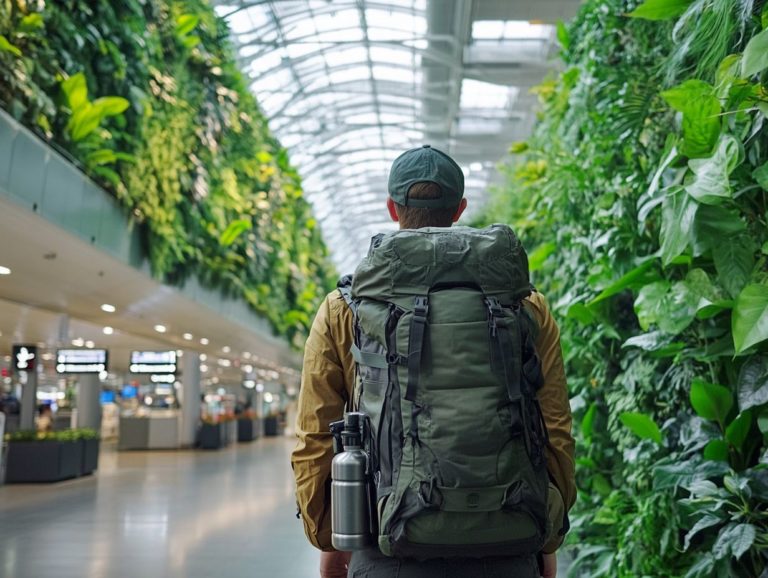5 Tips for Sustainable Travel During the Holidays
Traveling during the holidays can be a delightful experience, especially when you choose to embrace sustainable travel practices. Here are five practical tips to help you minimize your environmental footprint while enjoying your trips. From packing light and selecting eco-friendly accommodations to supporting local businesses, these strategies not only enhance your travel experience but also contribute positively to the environmental impact of your journeys. You will also discover the challenges of eco-tourism and sustainable travel. Join us on this journey to celebrate the season in an eco-friendly way!
Contents
- Key Takeaways:
- 1. Pack Light and Bring Reusable Items
- 2. Choose Eco-Friendly Accommodations
- 3. Use Public Transportation or Walk Whenever Possible
- 4. Support Local and Sustainable Businesses
- 5. Reduce, Reuse, and Recycle
- How Can Sustainable Travel Benefit the Environment?
- Frequently Asked Questions
- What are 5 tips for sustainable travel during the holidays?
- Why is it important to practice sustainable travel during the holidays?
- How can I practice sustainable travel without sacrificing convenience?
- Can I still enjoy luxury travel while being sustainable?
- Check out these resources to enhance your sustainable travel plans:
- How can I encourage others to join me in practicing sustainable travel during the holidays?
Key Takeaways:

- Pack light and bring reusable items like water bottles to reduce waste and carbon footprint.
- Choose eco-friendly accommodations, especially those with green energy sources, for a more sustainable travel experience.
- Utilize public transportation or bike hire whenever possible to decrease transportation emissions.
1. Pack Light and Bring Reusable Items
Packing light and opting for reusable items are essential practices for your sustainable travel journey. By doing so, you significantly reduce your carbon footprint the total amount of greenhouse gases produced directly and indirectly by your activities. You also minimize the use of single-use plastics during your adventures.
When you choose a lightweight approach, you ll likely discover that simplicity enhances your experience. Using a stainless steel water bottle not only ensures you have hydration at your fingertips, but it also keeps your drinks either cold or hot offering you personal convenience on the go.
Carrying a set of reusable shopping bags makes your purchases effortless, whether you’re exploring local markets or picking up essentials at grocery stores. This small action helps combat the ever-growing issue of plastic waste.
These seemingly minor yet impactful choices collectively contribute to environmental preservation, ensuring that the breathtaking destinations you love remain unspoiled for future generations to enjoy. Start packing your reusable items today for a greener trip tomorrow!
2. Choose Eco-Friendly Accommodations
Choosing eco-friendly accommodations is vital for sustainable tourism, as these establishments often harness renewable energy, use energy-efficient lighting, and embrace climate-conscious practices to reduce their environmental footprint. These lodgings frequently boast recognized certifications, such as the EU eco-label, providing you with peace of mind that your choices are aligned with environmentally responsible standards.
Selecting these accommodations helps preserve natural habitats and strengthens the local economy, backing businesses that prioritize sustainability. For example, hotels that implement waste reduction strategies and source local, organic products not only shrink their carbon footprint but also create job opportunities within the community. Consider the eco-lodges in Costa Rica, which offer immersive experiences in nature while adhering to stringent eco-friendly guidelines, showcasing the harmonious relationship between responsible travel and economic growth.
3. Use Public Transportation or Walk Whenever Possible
Embracing public transportation or opting to walk whenever possible not only enriches your travel experience but also plays a crucial role in reducing the carbon emissions tied to tourism, establishing it as a cornerstone of eco-friendly travel practices.
By choosing these methods, you not only help decrease the number of private vehicles clogging the roads but also actively contribute to the preservation of local ecosystems that could otherwise suffer from pollution. Public transport systems are often meticulously designed to minimize land use and environmental degradation, making them more sustainable options.
Immersing yourself in a community through its public transit can lead to enriching cultural interactions and local insights that you might miss otherwise. To maximize your experience with local transportation, it’s wise to familiarize yourself with schedules, routes, and any available passes. This preparation ensures a seamless journey while navigating new cities, allowing you to explore with confidence and ease.
4. Support Local and Sustainable Businesses

Supporting local and sustainable businesses is a fantastic way to impact the local economy while enjoying unique experiences that showcase the rich culture and heritage of your travel destination.
When you choose to visit these places, you help create a thriving community where tourism that involves local communities flourishes. This choice not only helps preserve local traditions but also encourages sustainable practices that are good for the environment.
Sourcing organic food from nearby farms enriches your culinary experience with fresh, seasonal flavors. This approach cuts down on carbon emissions and fosters a connection to the land while deepening your understanding of local cultures through local produce.
The ripple effects of such choices strengthen community resilience and encourage a sense of responsible care for the environment among both visitors and residents.
5. Reduce, Reuse, and Recycle
The mantra of reducing, reusing, and recycling is central to sustainable travel. It helps you reduce food waste, lessen pollution, and adopt responsible practices that protect our planet.
You can easily incorporate these principles into your journeys. For example, bringing a reusable water bottle cuts down on plastic waste and keeps you hydrated wherever you go.
Using cloth bags for local shopping also helps reduce waste. Opting for accommodations that prioritize recycling programs shows your commitment to eco-friendly practices.
By repurposing items like turning an old t-shirt into a shopping bag you lessen your carbon footprint and promote ecological sustainability. Remember, every small action matters and can lead to a big impact!
How Can Sustainable Travel Benefit the Environment?
Sustainable travel enriches the environment by promoting eco-friendly practices that lower carbon emissions, support wildlife conservation, and drive climate action.
By prioritizing local economies and reducing resource consumption, you play a crucial role in protecting natural habitats while enjoying unique cultural experiences.
Consider eco-tourism initiatives (travel that supports conservation efforts) like wildlife sanctuaries and tourism that involves local communities; these efforts not only protect endangered species but also empower local economies.
Take, for instance, a project in Costa Rica where tourists participate in reforestation efforts. This shows how your travels can directly benefit ecosystem health.
Choosing sustainable accommodations that use renewable energy and promote recycling highlights the positive effects of your responsible travel choices. Every adventure becomes a meaningful step toward caring for our planet.
What Are the Challenges of Sustainable Travel During the Holidays?
While sustainable travel has many benefits, it also faces significant challenges during the holiday season. Increased pressure on the tourism industry and heightened carbon footprints complicate maintaining eco-friendly practices during busy times.
The influx of travelers often leads to over-tourism at popular destinations, straining local resources and ecosystems. Many places struggle to manage the waste generated by this surge, increasing litter and plastic pollution.
It can be tough to find eco-friendly places to stay, as hotels are often fully booked or less focused on sustainability during peak periods.
To help tackle these challenges, consider the following strategies:
- Explore alternative destinations
- Book well in advance
- Seek out local, eco-friendly lodging options
Planning your trips around off-peak seasons can lead to a more authentic experience while reducing your overall impact.
Join the movement for sustainable travel and make a difference today!
How Can One Make Sustainable Travel a Year-Round Practice?

To cultivate sustainable travel as a year-round lifestyle, weave responsible travel habits into your daily routine. Actively seek eco-friendly practices to reduce carbon emissions and become more aware of your environmental impact.
Take time to research and select accommodations that prioritize sustainability, like eco-friendly hotels. Champion businesses that resonate with your values.
Choosing local transportation methods, such as biking or public transit, not only minimizes your carbon footprint but also immerses you in a more authentic experience of your destination.
Engaging with local communities through volunteer opportunities or supporting artisans creates a significant positive ripple effect on local economies. Your conscious choices foster a deeper appreciation for cultural heritage.
By continuously educating yourself about sustainable tourism practices, you empower yourself to make informed decisions. This ensures your journeys enrich both the environment and the communities you encounter.
What Are Some Sustainable Travel Destinations?
There are countless sustainable travel destinations across the globe, including the esteemed European Green Capital cities. These cities prioritize environmental preservation while offering rich experiences steeped in local culture and eco-tourism.
Cities like Amsterdam and Ljubljana shine with their innovative approaches to sustainability. With extensive bike lanes and inviting green spaces, these urban gems beckon eco-conscious travelers to explore at their leisure.
Coastal towns such as Tulum, Mexico, and Monteverde in Costa Rica feature eco-friendly hotels and sustainable practices. They allow you to connect deeply with local wildlife and communities.
Immerse yourself in authentic culinary experiences, engage in conservation activities, and browse local artisan markets. You ll minimize your carbon footprint while supporting local economies!
Each of these destinations showcases breathtaking natural beauty and fosters unique connections between visitors and the culture. This encourages a travel experience that is as enriching as it is sustainable.
What Are Some Common Misconceptions About Sustainable Travel?
Common misconceptions about sustainable travel might hold you back from embarking on eco-friendly journeys. You may believe that it s overly complicated, expensive, or less enjoyable than traditional travel.
In truth, sustainable travel can be both accessible and enriching. It offers a wealth of opportunities for unforgettable experiences. For example, exploring local food markets supports regional economies and lets you dive into authentic culinary adventures with fresh, seasonal produce.
Joining community-led tours provides genuine insight into local culture, often without the hefty price tag found at mainstream tourist attractions. Opting for public transportation, biking, or even walking enhances your journey, allowing for deeper exploration while keeping your environmental impact to a minimum.
Ultimately, embracing these eco-friendly options can lead to adventures that are just as enjoyable if not more so than conventional travel! Start planning your eco-friendly trip now!
How Can Travelers Educate Themselves About Sustainable Tourism?
Elevate your travel experience by learning about sustainable travel. Start by seeking resources that champion responsible travel, engaging with local businesses, and integrating eco-friendly tips into your planning.
Exploring websites like Sustainable Travel International or reading books such as “Leave Only Footprints” by Conor Knighton will provide valuable insights on minimizing your environmental impact during your adventures. Additionally, learning how to plan a sustainable travel itinerary can enhance your experience. Organizations like the Global Sustainable Tourism Council offer guidelines to help you select eco-friendly options that align with your values.
Interacting with local communities enriches your journey and deepens your understanding of cultural practices and conservation efforts. Support local artisans and markets to enhance your travel experience while ensuring that the benefits of tourism directly support the communities you visit.
Frequently Asked Questions

What are 5 tips for sustainable travel during the holidays?
- Choose eco-friendly transportation options such as trains or buses instead of flying.
- Bring reusable items like water bottles and utensils to reduce single-use plastic waste.
- Stay in environmentally-friendly accommodations such as eco-lodges or hotels with green certifications.
- Support local businesses and artisans instead of purchasing souvenirs made of imported materials.
- Offset your carbon footprint by donating to reputable carbon offset programs.
Why is it important to practice sustainable travel during the holidays?
Sustainable travel minimizes the negative impact of tourism on the environment and local communities. This is crucial during the holidays when there is a significant increase in travel and consumption.
How can I practice sustainable travel without sacrificing convenience?
One simple way is to opt for digital tickets and itineraries instead of printing them. This reduces paper waste and is also more convenient as you won’t have to worry about losing physical documents.
Can I still enjoy luxury travel while being sustainable?
Absolutely! Look for luxury accommodations that prioritize sustainability, such as those with LEED certification or using renewable energy sources. Offset carbon emissions from your luxury travel by supporting carbon offset programs.
Check out these resources to enhance your sustainable travel plans:
Many online resources and apps can help you plan for sustainable travel, such as Sustainable Travel International and Green Traveler Guides. Research sustainable tourism organizations and initiatives in your destination for more information.
How can I encourage others to join me in practicing sustainable travel during the holidays?
Lead by example and share your experiences and tips with friends and family. Suggest eco-friendly activities and support local businesses together. You can also educate others about the benefits of sustainable travel and its positive impact on the environment and local communities.
Make a difference by traveling sustainably this holiday season! Share your sustainable travel stories and tips with others.






